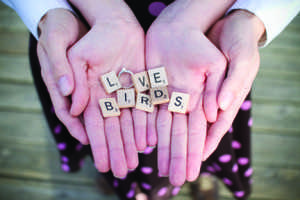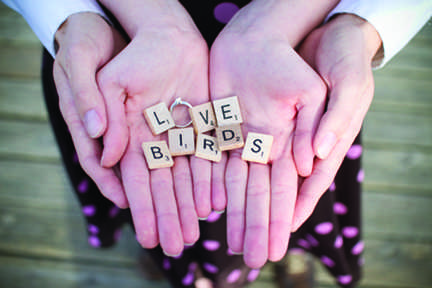
By Sarah Hughes
There are many concerns people have about marriage and a great body of research on the
subject of marriage. There are many sources of debate on how, if and when one should get
married.
With regards to modern concepts of marriage, a shift in age at first marriage as well as
economic factors come in to play. The Cougar Chronicle asks a few women on campus to
explain and consider their feelings towards marriage, in order to get a concept of how students
plan and feel on the topic in comparison to national trends.
Time Magazine just recently explored modern marriage in an article entitled The Childfree Life
in Aug. 2013, commenting how many people are forgoing children in a search for success that
they include marriage in.
A vast body of research has been conducted on the subject of marriage from varying sources,
for diverse reasons. The idea that marriage should be discussed in educational institutes for
students is a controversial one that some believe would prevent a great deal of problems in
young people’s later marriages.
Throughout time, marriage has been championed by many governments on the basis that it
provides stable family-structures and more citizens born. Records are kept of marriage to track
trends and do other clerical tasks from.
According to U.S. Census data, the estimated median age of first marriage by sex for 2011
was 28.7 for men, and 26.5 for women. In 1890 average ages were 26.1 for men, and 22.0 for
women. In 2001 men and women married at 26.9 and 25.1, respectively. Graphs for that data can be found at http://www.census.gov/hhes/
are being delayed and lasting longer according to most psychology textbooks.
Many have strong ideas of when women should marry by. Some girls spend hours planning
exact details of their weddings from a young age. Girls grow up hearing tales of Prince
Charming types and Princesses frothed in silks that get married and “live happily ever after.”
Concerns about marriage abound, from the funny to the serious and studied. One just has to
research one topic and new questions appear in plethora on browser search results.
Many are concerned that marriage has unseen drawbacks. In Choices in Relationships: An
Introduction to Marriage and the Family by David Knox and Caroline Schacht psychology
students and readers are asked to be mindful of choices regarding relationships, as “Not making
a decision is a decision by default” and familial and marital relationships are considered “among
the most important.”
“People marry because they anticipate greater rewards from being married than from being
single” said Knox and Schacht.
With this overestimation of happiness to be concerned of, many may be unaware of the realities
of marriage and therefore making uniformed plans. What do CSUSM students think about
marriage? Are they concerned? Do they have plans regarding it? And if so do those plans
change overtime?
In a small sample of convenience, conducted of five women at CSUSM on Oct. 14, a few
questions related to marriage were asked. Participants surveyed were 18 to 25 in ages. On how
they felt about marriage, students seemed to generally concede that it was a positive thing.
They had some differing perspectives.
“I feel like nowadays, in modern times, people give up on marriage, as opposed to back in the
day when you had to stay with the person.” Celeste Estrada, 18, said.
“I like marriage – it’s a good thing if people do it right.” Zana Taylor, 18, said.
“I really like the idea of marriage. I feel like marriage allows someone to have a best friend, and
someone to lean on.” Julie Meram, 20, said.
“I would really love to be married someday. I don’t know if it’s because we’re supposed to. [We]
feel something missing and just want someone there.” said Amy, 22.
“My general feelings about marriage? I think its a good thing,” said Emily Friedewald, 25.
When asked of their plans regarding marriage, most of the women kept their answers brief.
Most hoped to get married at some point and a few had conditions for this.
“As of now no [plans], in the near future, hopefully, to the right one.” Zana Taylor, 18 said.
One was engaged and had plans with her fiancé.
“I am engaged recently, but we don’t plan to get married till two years from now, till we finish
our degrees. So very loose plans there. We’re planning on finishing our degrees so we’re more
financially secure. There’s things we want for the wedding. We’d hate to have our parents have
to pay for it – and other little things – He doesn’t want to have his braces on in the wedding
photos. With work and school, and trying to plan it, I’d be stressed if it was any sooner.” said
Emily Friedewald, 25.
When asked if they had an age they would like to be married by, some had a vague idea of
which decade, but not a hard fast number.
“I would like to be married by late 20s or mid 20 to 25 to 30ish” said Celeste Estrada, 18.
Zana Taylor, also 18, had a more specific number to marry of 24 or 25.
Julie Meram, 20, explained her preferred age with a reminder of the fleeting aspects of life.
“Preferably anything before 30ish – if someone is going to be my best friend I want to spend as
much time as possible with them. You don’t know what’s going to happen in life,” she said.
Amy expressed feelings of growth and leaving it open to what happens, “Growing up I thought it
would be by a certain age, but now I don’t.” she said.
Preceding her engagement, Friedewald, 25, says she did have plans about when she hoped to
be married by.
“Yeah, I did have rules for myself: marriage, children, done with school by a certain age, second
child even! I had a time-frame, but I’m younger than I thought I was going to be,” Friedewald
said.
Of the women questioned, most were not currently in a relationship. One “just got out of one”
and another was “unfortunately not” in a relationship. Friedewald, 25, referred back to her “loose
plans” of engagement.
The women asked seemed to feel that a good self-concept, or that “knowing oneself” was fairly
important to relationships. Reasons for why it was important seemed to echo each other in
ideas. The women seemed to feel they had a handle on who they were, but expressed a sense
of revision and ambiguity connected with the idea of self-knowledge.
On whether she knew herself, Celeste Estrada, 18, expressed thought about the transitioning
college experience.
“[Do I know myself fully?] I don’t think so. I’m still figuring it out – college is a new experience.
Yes [self-understanding] is important, obviously not everyone in a relationship knows
themselves. I think it would be a better relationship if both people did,” Estrada said.
“Yeah, I know myself really well, but there’s still a lot to learn. Yes, [knowing oneself] is very
important. How can you expect to be in a relationship with someone else if you don’t know
yourself?” Zana Taylor, 18, said.
On the topic of knowing one’s self, Julie Meram, 20 said, “Yeah I do. Its extremely important.
You can’t expect someone to get to know you if you don’t know yourself.”
When asked whether she knew herself, Amy, 22, said “I like to think I do, but sometimes I’m
not sure. Its not super important that you know yourself fully, because it kind of depends on
who you’re with. They help you put the pieces together. Growing with someone is an important
process.”
“Its important to have a sense of self, a sense of identity, for sure. I think the collective
experiences in life have formed who I am – I’m still learning. One always continues to learn,
collective experiences are important. When you stop learning about yourself that’s a bad thing.
People should continually do that. Yes [knowing yourself] is important. There’s that saying
– “You can’t love someone else until you know yourself first” – I think that’s true,” said Emily
Friedewald, 25.


